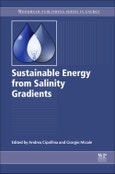Salinity gradient energy, also known as blue energy and osmotic energy, is the energy obtainable from the difference in salt concentration between two feed solutions, typically sea water and river water. It is a large-scale renewable resource that can be harvested and converted to electricity. Efficient extraction of this energy is not straightforward, however. Sustainable Energy from Salinity Gradients provides a comprehensive review of resources, technologies and applications in this area of fast-growing interest.
Key technologies covered include pressure retarded osmosis, reverse electrodialysis and accumulator mixing. Environmental and economic aspects are also considered, together with the possible synergies between desalination and salinity gradient energy technologies.
Sustainable Energy from Salinity Gradients is an essential text for R&D professionals in the energy & water industry interested in salinity gradient power and researchers in academia from post-graduate level upwards.
For more than ten years the Editors have been sharing substantial research activities in the fields of renewable energy and desalination, successfully participating to a number of European Union research projects and contributing to the relevant scientific literature with more than 100 papers and 2 books on Desalination technologies and their coupling with Renewable Energy. They are intensely working in the field of Salinity Gradient Power, carrying out research with specific focus o.n open-loop and closed-loop reverse electrodialysis and pressure retarded osmosis.
Please Note: This is an On Demand product, delivery may take up to 11 working days after payment has been received.
Table of Contents
1. Salinity gradient energy
2. Pressure retarded osmosis: Fundamentals
3. Pressure retarded osmosis: Applications
4. Reverse electrodialysis: Fundamentals
5. Reverse electrodialysis: Applications
6. Capacitive mixing and mixing entropy battery
7. Salinity gradient engines
8. Special applications of reverse electrodialysis
9. Salinity gradient power and desalination
10. Environmental aspects and economics of salinity gradient power (SGP) processes
Authors
Andrea Cipollina University of Palermo, Italy.Andrea Cipollina is Assistant Professor of Chemical Engineering at the Dipartimento di Ingegneria Chimica, Gestionale, Informatica, Meccanica, Università degli Studi di Palermo, a Member of the Italian Order of Chartered Engineers and a Member of the Italian Association of Chemical Engineering.
For more than ten years, Andrea Cipollina and Giorgio Micale have been sharing substantial research activities in the fields of renewable energy and desalination, successfully participating to a number of European Union research projects and contributing to the relevant scientific literature with more than 100 papers and 2 books on Desalination technologies and their coupling with Renewable Energy. They are intensely working in the field of Salinity Gradient Power, carrying out research with specific focus on open-loop and closed-loop reverse electrodialysis and pressure retarded osmosis.
Giorgio Micale University of Palermo, Italy. Giorgio Micale is Associate Professor of Chemical Engineering at Dipartimento di Ingegneria Chimica, Gestionale, Informatica, Meccanica, Università degli Studi di Palermo, a Member of the Italian Order of Chartered Engineers and an Associate Member of the Institution of Chemical Engineers, UK.







